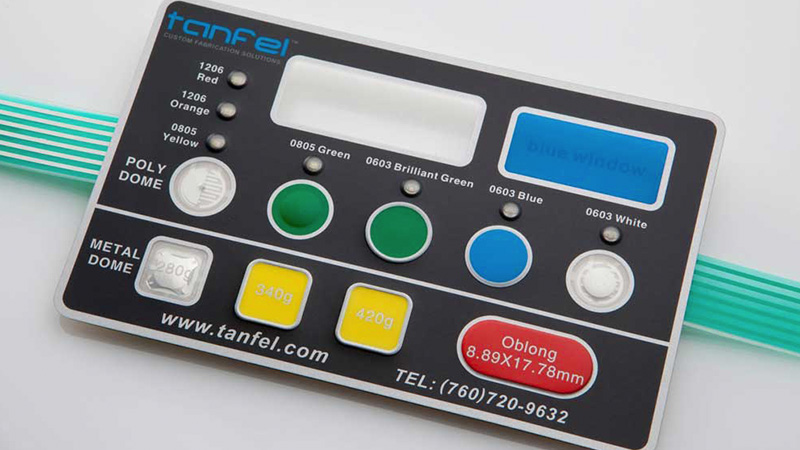The Perks of Membrane Switches Over Standard Switches in Harsh Environments
The Perks of Membrane Switches Over Standard Switches in Harsh Environments
Blog Article
Why Membrane Layer Changes Are Vital for Long Lasting Control Solution
Membrane layer switches play a pivotal function in guaranteeing the resilience and integrity of control systems across various markets. As we explore the complex advantages of membrane buttons, it ends up being evident that their importance goes beyond mere capability, influencing user experience and functional efficiency.
Overview of Membrane Layer Switches
Membrane layer switches are versatile and trusted components frequently made use of in various electronic control systems. These switches consist of several layers, consisting of a graphic overlay, a spacer layer, and a printed circuit layer. The graphic overlay supplies both functional and aesthetic design, while the spacer layer makes certain that the buttons are activated just when pushed. The published circuit layer has conductive traces that complete an electrical circuit when the membrane is pushed, enabling the device to react to individual inputs.
Membrane buttons are often preferred in applications needing a small and lightweight design, making them suitable for handheld devices, clinical tools, and commercial machinery. They can be tailored to fulfill details customer demands and can incorporate different features such as backlighting, tactile responses, and numerous shades. In addition, membrane buttons are immune to dust, moisture, and pollutants, making them ideal for atmospheres where toughness is necessary.
Advantages of Longevity
In lots of applications, the sturdiness of membrane switches over offers substantial benefits that enhance their total efficiency and dependability. These switches are created to endure harsh atmospheres, making them excellent for use in demanding problems such as high humidity, extreme temperatures, and exposure to chemicals. Their durable building aids to avoid damage from physical effect, guaranteeing durable performance and lessening the need for frequent substitutes.
Additionally, membrane buttons are resistant to deterioration, which is vital in applications where regular interaction occurs. This durability translates to lower upkeep prices, as organizations gain from lowered downtime and less service disturbances. The encapsulated style of membrane layer changes protects internal components from dust and wetness access, more contributing to their life-span (membrane switch).
An additional advantage is their capacity to keep constant efficiency in time. With a high resistance for mechanical anxiety, these switches maintain their responsive feedback and electrical stability, making sure customer complete satisfaction. Ultimately, the toughness of membrane changes not just enhances operational performance yet also fosters confidence in their reliability, making them a recommended choice for control systems across numerous markets.
Applications in Different Industries
Durable control systems using membrane layer buttons locate comprehensive applications across a series of sectors, each gaining from the unique qualities these buttons use. In the clinical sector, membrane layer buttons are vital for gadgets such as patient displays and analysis tools, where dependability and ease of cleansing are vital. Their resistance to wetness and impurities ensures they maintain capability in sterilized environments.
The automobile market leverages membrane buttons for dashboard controls and infomercial systems, where they supply streamlined, low-profile user interfaces that boost individual experience. These switches are additionally created to endure extreme problems, consisting of direct exposure to extreme temperature levels and vibrations.
In commercial settings, membrane layer buttons are frequently used in equipment control panels, using responsive comments and resilience required for high-usage applications. Their capability to resist chemicals makes them ideal for manufacturing settings where spills and contaminants are regular.

Consumer electronic devices, such as kitchen home appliances and remotes, also use membrane layer buttons for their convenience and cost-effectiveness. Generally, the flexibility and robust nature of membrane layer changes make them crucial across different markets, making certain effective operation and durability in control systems.
Style and Visual Allure
While capability is critical, the layout and aesthetic appeal of control systems geared up with membrane switches play a vital role in individual interaction and general experience (membrane switch). The visual style of these switches can dramatically affect individual assumption and interaction. A properly designed membrane switch boosts the beauty of click over here now the tool, making it more attractive to customers and promoting a connection between the customer and the product
Membrane layer changes use a good deal of adaptability in layout, enabling suppliers to tailor graphics, shades, and structures to align with brand identity and item visual appeals. The usage of dynamic shades and distinct patterns can attract interest, while tactile responses can strengthen the individual's communication with the device. Additionally, the ability to incorporate LED signs and backlighting into the membrane layer switch layout supplies both functional and visual benefits, boosting exposure and usability in numerous atmospheres.

Enhancing User Experience

Furthermore, membrane layer buttons can be customized to incorporate graphical interfaces, improving functionality by offering details in a clear and intuitive manner (membrane switch). This personalization can include icons, labels, and shade coding that overview customers through complex functionalities easily. In addition, their adaptability enables assimilation in various atmospheres, guaranteeing constant performance whether in industrial equipment or customer electronics
The resilience of membrane layer buttons likewise plays an essential duty in customer experience. By standing up to extreme conditions and extended usage, these switches decrease the likelihood of system failures, hence promoting reliability and customer confidence. Ultimately, the strategic usage of membrane layer changes not just elevates capability yet additionally considerably enriches individual communication with control systems, making them an indispensable part in modern design.
Final Thought

Report this page